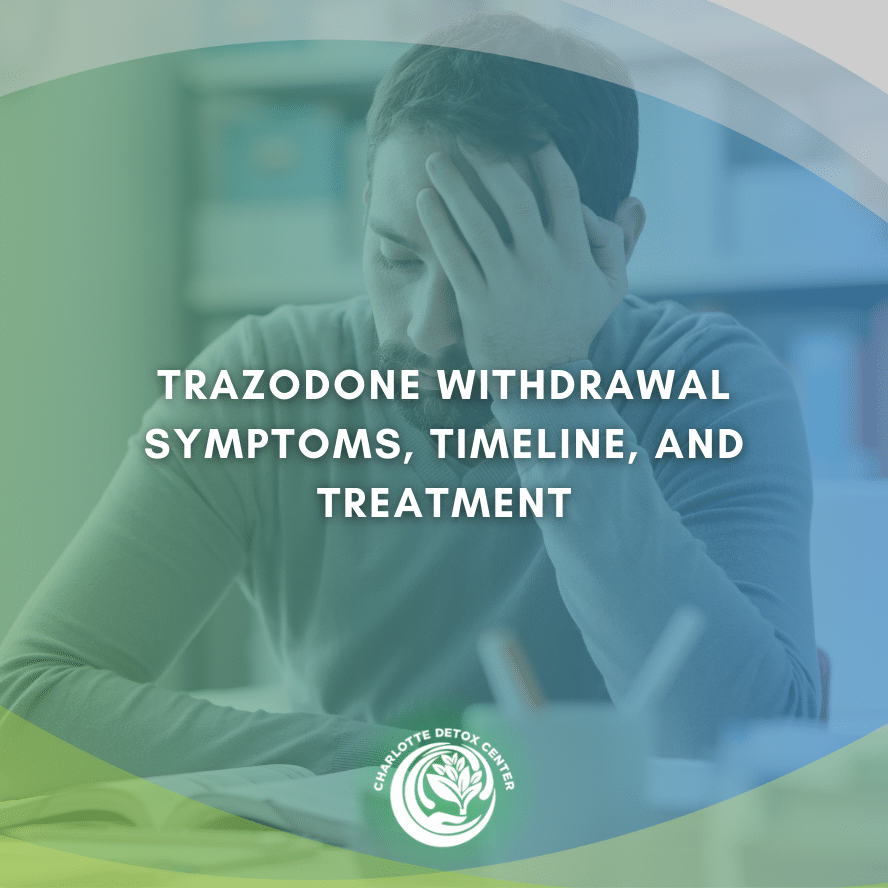Trazodone Withdrawal Symptoms, Timeline, and Treatment

Medically Verified: 2/1/24
Medical Reviewer
Chief Editor

All of the information on this page has been reviewed and verified by a certified addiction professional.
Trazodone is an antidepressant medication commonly prescribed to treat depression and insomnia. The medication belongs to a class of drugs known as serotonin modulators, which work by increasing the amount of serotonin in your brain.[1] As a result, trazodone can be highly effective in managing the symptoms of depression and helping individuals with insomnia get some needed rest.
Trazodone is not known to be habit-forming or addictive but you can develop a dependency on the medication. Physical dependence means that your body relies on the drug to function normally, and without it, you may experience symptoms of withdrawal. While physical dependency is a symptom of addiction, you can be dependent on a substance without meeting the criteria for a substance use disorder.
If you are dependent on trazodone, you will experience withdrawal symptoms if you suddenly stop taking the medication. Being aware of the symptoms, timeline, and treatment associated with trazodone withdrawal can help you receive the medical assistance you need.
Trazodone Withdrawal Symptoms
Withdrawal occurs when your brain and body are attempting to adjust to the absence of a particular substance it was accustomed to having. Unfortunately, withdrawal can be an extremely challenging process, sometimes becoming dangerous when you do not have access to medical treatment.
The common symptoms of trazodone withdrawal include:[2]
- Agitation
- Anxiety
- Insomnia
- Dizziness
- Confusion
- Headache
- Irritability
- Nervousness
- Depressed moods
- Suicidal thoughts or actions
- A rebound of depression or insomnia symptoms
If you have been taking trazodone consistently, do not suddenly stop taking it without consulting your doctor. While it is uncommon for people to abuse trazodone, some people may take large amounts of the medication for its drowsing effects. Anyone who abuses trazodone should attend drug detox program to safely overcome the withdrawal process.
How Long Does Trazodone Withdrawal Last? Understanding the Trazodone Withdrawal Timeline
The half-life of trazodone is between 5 to 9 hours. Most substances are completely eliminated from your body after 5 half-lives, meaning trazodone will be completely metabolized between 25 to 45 hours after your last dose. Trazodone withdrawal symptoms will begin a day or two after your stop taking it.
The duration and severity of your withdrawal symptoms will depend on a variety of factors including:
- How often you took trazodone
- The dosage of trazodone you were taking
- Your age, metabolism, and weight
- Your liver and kidney health
- Whether you were abusing other substances
While there is little research on the trazodone withdrawal timeline, most individuals report that their symptoms subside within 2 to 3 weeks. However, some people may continue to experience symptoms for months because they are experiencing antidepressant withdrawal syndrome (AWS), and medications like trazodone cause chemical changes in your brain that can last even after the drug is removed from your system.[3]
Since the symptoms of withdrawal can linger for months, it is important to consult with a medical professional before quitting trazodone abruptly. Working with a medical detox program can prevent you from experiencing severe symptoms of withdrawal and allow your body to adjust to the absence of trazodone naturally.
What to Expect During Trazodone Detox
When you think of medical detox, you probably imagine someone recovering from opioid or alcohol withdrawal. While these withdrawal symptoms can become much more severe, the treatment process is very similar. For example, tapering medications are used to help people overcome opioid and alcohol withdrawal symptoms just as they are used to treat trazodone withdrawal.
When you attend detox for trazodone dependency, you will be slowly tapered off the medication to ensure that you do not develop antidepressant withdrawal syndrome (AWS). Your doctor will provide you with trazodone at lower dosages over some time to allow your body to naturally adjust to the absence of the medication. Depending on your original dosage of trazodone, it typically takes 2 to 3 weeks for your doctors to taper you off of the medication safely.
In addition to tapering you off of trazodone, you will be monitored consistently to ensure medical and psychological stability. Because it is common to take trazodone for depression, you may experience an increase in mental health symptoms. If your symptoms become too difficult to manage without medication, your medical team may suggest a different antidepressant for you to try.
Lastly, you will have access to support from licensed mental health experts like therapists, psychiatrists, and substance abuse counselors. This ensures that you will receive the psychological support and treatment necessary to keep you comfortable, and safe, and help you learn how to manage your symptoms without trazodone.
Finding Help for Trazodone Abuse and Dependence
If you or a loved one are dependent on trazodone, you may require professional detox treatment to prevent yourself from experiencing severe symptoms of withdrawal. While trazodone is not known to be habit-forming, it is possible to begin abusing the substance. Any form of substance abuse should be treated in a medical detox facility.
Our licensed drug detox facility in Charlotte, NC is designed to help you begin your addiction treatment while supporting you through the potential struggles of drug abuse withdrawal symptoms. Call today to get the help you deserve.
References:
